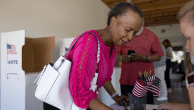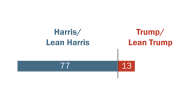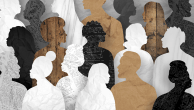Americans’ views of progress on racial equality, different forms of protest and what needs to change
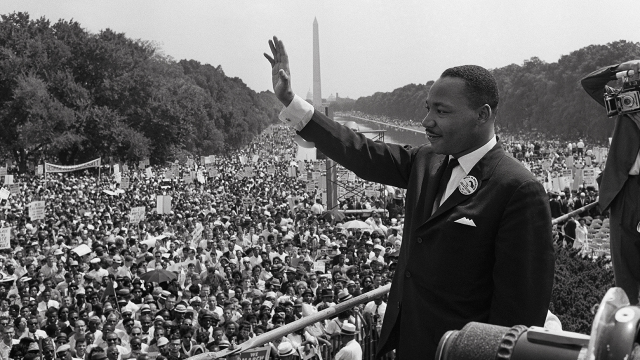
Pew Research Center conducted this study to explore how Americans view the legacy of Martin Luther King Jr. and the United States’ progress on racial equality 60 years after the March on Washington, which took place on Aug. 28, 1963.
This analysis is based on a survey of 5,073 U.S. adults conducted April 10-16, 2023. Everyone who took part is a member of the Center’s American Trends Panel (ATP), an online survey panel that is recruited through national, random sampling of residential addresses. Address-based sampling ensures that nearly all U.S. adults have a chance of selection. The survey is weighted to be representative of the U.S. adult population by gender, race, ethnicity, partisan affiliation, education and other categories. Read more about the ATP’s methodology.
Read more about the questions used for this report and the report’s methodology.
References to White, Black and Asian adults include those who are not Hispanic and identify as only one race. Hispanics are of any race.
All references to party affiliation include those who lean toward that party. Republicans include those who identify as Republicans and those who say they lean toward the Republican Party. Democrats include those who identify as Democrats and those who say they lean toward the Democratic Party.
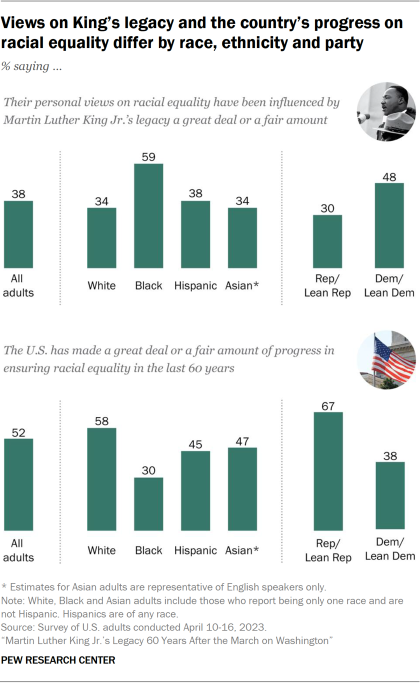
On Aug. 28, 1963, about 250,000 people gathered at the Lincoln Memorial in Washington, D.C., for the March on Washington for Jobs and Freedom, where Martin Luther King Jr. gave his historic “I Have a Dream” speech advocating for economic and civil rights for Black Americans.
As the 60th anniversary of the March on Washington approaches, we asked Americans about their views on:
- King’s legacy
- The country’s progress on racial equality
- What needs to change in order to achieve racial equality
For this report, we surveyed 5,073 U.S. adults from April 10 to April 16, 2023, using Pew Research Center’s American Trends Panel.1
Key findings:
- Most Americans say King has had a positive impact on the country, with 47% saying he has had a very positive impact. Fewer (38%) say their own views on racial equality have been influenced by King’s legacy a great deal or a fair amount.
- 60% of Americans say they have heard or read a great deal or a fair amount about King’s “I Have a Dream” speech. Black adults are the most likely to say this at 80%, compared with 60% of White adults, 49% of Hispanic adults and 41% of Asian adults.
- 52% of Americans say there has been a great deal or a fair amount of progress on racial equality in the last 60 years. A third say there’s been some progress and 15% say there has been not much or no progress at all. Still, more say efforts to ensure equality for all, regardless of race or ethnicity, haven’t gone far enough (52%) than say they have gone too far (20%) or been about right (27%).
- A majority (58%) of those who say efforts to ensure equality haven’t gone far enough think it’s unlikely that there will be racial equality in their lifetime. Those who say efforts have been about right are more optimistic: Within this group, 39% say racial equality is extremely or very likely in their lifetime, while 36% say it is somewhat likely and 24% say it’s not too or not at all likely.
- Many people who say efforts to ensure racial equality haven’t gone far enough say several systems need to be completely rebuilt to ensure equality. The prison system is at the top of the list, with 44% in this group saying it needs to be completely rebuilt. More than a third say the same about policing (38%) and the political system (37%).
- 70% of Americans say marches and demonstrations that don’t disrupt everyday life are always or often acceptable ways to protest racial inequality. And 59% say the same about boycotts. Fewer than half (39%) see sit-ins as an acceptable form of protest. And much smaller shares say the same about activities that disrupt everyday life, such as shutting down streets or traffic (13%) and actions that result in damage to public or private property (5%).
Demographic and partisan differences
These survey findings often differ by race, ethnicity and partisanship – and in some cases also by age and education.
Some examples:
- 59% of Black Americans say their personal views on racial equality have been influenced by Martin Luther King Jr. a great deal or a fair amount. Smaller shares of Hispanic (38%), White (34%) and Asian (34%) Americans say the same.
- Adults ages 65 and older and those with at least a bachelor’s degree are more likely than younger adults and those with less education to be highly familiar with King’s “I Have a Dream” speech.
- 58% of White adults say there has been a great deal or a fair amount of progress on racial equality in the last 60 years. This compares with 47% of Asian adults, 45% of Hispanic adults and 30% of Black adults. Republicans and those who lean Republican (67%) are more likely than Democrats and Democratic leaners (38%) to say this.
- 83% of Black adults say efforts to ensure equality for all, regardless of race and ethnicity, haven’t gone far enough. This is larger than the shares of Hispanic (58%), Asian (55%) and White (44%) adults who say the same. Most Democrats (78%) say these efforts haven’t gone far enough, compared with 24% of Republicans. Some 37% of Republicans say these efforts have gone too far.
- Black Americans, Democrats and adults younger than 30 who say efforts to ensure racial equality haven’t gone far enough are among the most likely to say several systems, ranging from the economic system to the prison system, need to be completely rebuilt to ensure equality.

